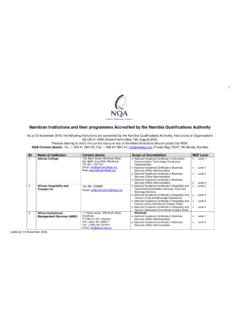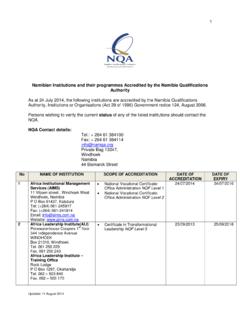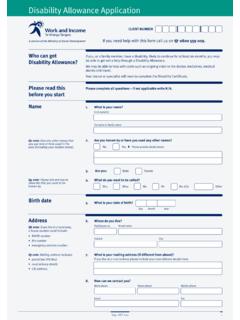Transcription of KNOW YOUR NQA - Namibia Qualifications Authority
1 NQA2 VisionGlobally reputable Qualifications Authorityempowering people in NamibiaMissionTo Sustain a National Framework that assures quality qualificationsValuesTransparencyInnovati onIntegrityAccountabilityExcellence3 The Namibia Qualifications Authority (NQA) is a State Owned Enterprise established through the Namibia Qualifications Authority Act no. 29 of 1996. The NQA s highest decision making body is the Council which is appointed by the Line Minister. What are the duties of the NQA?The NQA has ten functions as stipulated in the Act, including but not limited to: To set up and administer the National Qualifications Framework (NQF); Accrediting training providers to ensure that they have the capacity to deliver courses at the appropriate standard. Evaluate Qualifications to determine the value of a qualification and give it a corresponding level on the National Qualifications Framework.
2 Evaluation is also done to verify authenticity, legality and validity of the awarding body and qualification. Set up the occupational standards for any occupation, job, post or position in any career structure; Set the curriculum standards required for achieving the occupational standards for a given occupation, job, post, position in a career structure; Evaluate and recognize competencies learnt outside formal value does NQA add to thetraining and educator sector?The NQA is the national regulator in the training and education sector in terms of all matters pertaining to Qualifications . It is tasked with the responsibility of ensuring that Qualifications are quality assured and they are in line with the aspirations of the Namibian NQA thus monitors and advices on the standards and quality of training and education in Namibia .
3 This not only ensures consumer protection for those investing in education, but also safeguards the country s is the NQA located?The NQA operates from its office located at the corner of Bismarck and Dr. W. Kulz Street in is the NQA?For more information, please contact us on:Tel: +264 (61) 384 100 Email: Website: GertzeChief Executive Officer: NQAAT A GLANCEWhat is Accreditation? Accreditation is confirmation by the NQA that an institution has the capacity to provide specified courses and assess the performance of persons enrolled in such a applies to any person, institution or organisation offering training or educational services. What value does accreditation add to the education sector? Training providers (institutions) gain: External checks that they and their courses are of high quality Wider acceptance of their Qualifications Possible access to additional resources of funding or learner subsidiesLearners will: Gain assurance of the quality of the course they are enrolling in and that the outcomes of that learning will likely be recognised by employers and other providers Likely be able to move more freely between accredited institutions and have their previous earning recognised or cross-creditedIndustry and Professions gain: Greater confidence in the quality of education and training courses offered in Namibia Opportunities to work more closely with providers in the design and evaluation of should apply foraccreditation?
4 All training providers offering courses that lead to a qualification should apply for accreditation by the NQA. A training provider may be an individual or institution represented by or through a body corporate entity appropriately registered in is not limited to conventional education and training providers. Training centres, departments or institutes within companies, government departments and State Owned Enterprises are eligible to seek accreditation for their forms are available from the NQA House in Windhoek and on the website: do institutions apply for accreditation?Institutions or training providers are required to submit an application form to the NQA, accompanied by the required supporting documents. The applicant must also complete a self-evaluation form to ensure they meet the requirements of the accreditation standards before submitting their applications to the does the process of accreditation entail?
5 Upon receiving an application, the NQA will: Check for completeness Carry out a desk evaluation of the contents Conduct a site visit(s)Only once the NQA is satisfied that the applicant has met all the requirements will the NQA Council confirm accreditation. A Certificate of Accreditation is then issued as confirmation of the accreditation status of that training provider. Accreditation is valid for three (3) years, after which the training provider is required to reapply for accreditation. Why should I study at an accredited institution? The NQA only evaluates Qualifications obtained at accredited institutions, whether in Namibia or abroad. Evaluation is the process of confirming whether Qualifications are legal and authentic, as well as the accreditation status of the institution they were obtained from.
6 What are the consequences of studying at an unaccredited institution? Qualifications obtained at unaccredited institutions in Namibia or elsewhere in the world are not recognised as legal and therefore hold no value. As most employers request for NQA evaluated Qualifications , holders of Qualifications obtained at unaccredited institutions are likely to struggle securing employment and gaining acceptance at other institutions to further their are many unaccredited institutions operating in Namibia and elsewhere in the world. It is therefore important for all prospective students to verify the accreditation status of institutions before enrolling for studies so that they do not fall prey to these bogus institutions. How do I verify the accreditation status of an institution?
7 The NQA assists prospective students to verify the accreditation status of institutions in Namibia and anywhere else in the make use of this free service, simply visit the NQA website: complete the Request for accreditation status of an institution form and email it can also obtain the form from the NQA House in Windhoek. The NQA endeavours to respond to all queries within seven working days, depending on the availability of more information aboutthe accreditation process, pleasecontact us on:Tel: +264 (61) 384 100 Email: Website: Qualifications FrameworkWhat is the National Qualifications Framework (NQF)?What is the difference between NQA and NQF? NQA refers to the Namibia Qualifications Authority NQF refers to the National Qualifications Framework. The NQF classifies Qualifications based on a set of nationally agreed and internationally benchmarked criteria that clarify academic levels, learning outcomes and learner academic load.
8 It integrates all national Qualifications and provides pathways that link them systematically. What is a Qualification?What are the benefits of the NQF?For students, the NQF: Provides quality assured learning and Qualifications Enhances access to learning and assessment Provides opportunities for the previously disadvantaged members of society to have their knowledge and skills formally recognised. Enables people to develop to their full potential Provides a national database of learner achievementsFor employees, the NQF will: Provide opportunities for the recognition of on the-job training Enable progression to learning at higher levels and in formal institutions Provide them with Qualifications that employers demandFor employers, the NQF will: Provide access to employees qualified to world class standards Enable formal utilisation of quality assured company learning programmes Provide a central record or learner achievement.
9 How does the NQA determine the qualification levels?The NQA aligns outcomes of learning to the NQF level descriptors to confirm qualification levels determined by qualification is a Unit Standard?A Unit standard is a standalone NQF registerable component of a qualification, which can be independently awarded. How are the NQF credits calculated?Total hours of learning divided by 10 = 1 NQF NQF is a national system for organising Qualifications in a way that makes them easy to understand and compare. It a powerful tool for promoting lifelong learning in Namibia and to ensure that Qualifications are closely aligned with the economic, social and cultural needs of the country. The NQF also provides up-to-date information about all the relevant and legal Qualifications in Namibia . The NQF has 10 levels, each with increasing complexity of learning and defined by a unique descriptor.
10 It is made up of Unit Standards, Certificates, Diplomas and Degrees. Qualification refers to an award received after successful completion of quality assured learning and assessment. Types of Qualifications are Certificates, Diplomas and of NQF Qualification TypesDoctoral DegreeMaster DegreeBachelor Honours Professional BachelorBachelor Degree 10987654321 UnitStandardsWhat is the difference between a Level 3 and a Level 6 Certificate?The difference depends on the difficulty (complexity) of is the difference between a Level 7 Certificate, a Level 7 Diploma and a Level 7 Bachelor Degree?The difference is in the size of the qualification (volume of learning). Does Qualifications registered on NQF have an expiry date?Yes, all Qualifications registered on the NQF for Namibia are valid for a period of 5 (five) years after which they must be reviewed and then re-registered.

















